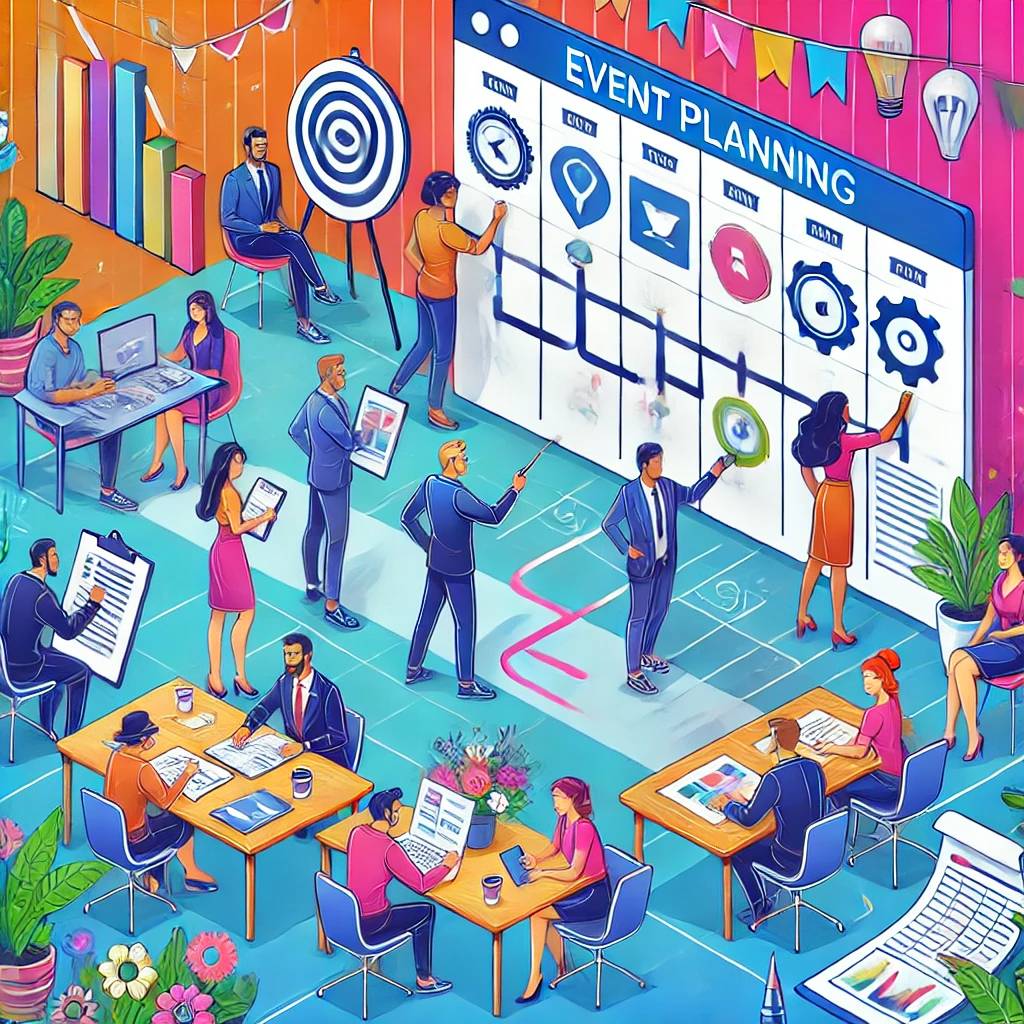10 Steps to Effective Event Planning for Beginners
Event planning can be an exciting yet challenging task, especially for beginners. Whether you’re organizing a corporate conference, a wedding, or a community fundraiser, a solid plan is crucial to ensure success. This guide takes you through 10 essential steps to effective event planning, with examples to help you visualize each step.
1. Define the Event’s Objectives and Goals
Before anything else, ask yourself, “What is the purpose of this event?” Clearly defining the objectives will help you shape every aspect of the planning process.
- Example: If you’re organizing a product launch, your goal may be to generate media buzz and attract potential customers. For a charity fundraiser, your objective might be to raise a specific amount of money while engaging the community.
Why It Matters: A clear goal keeps your team aligned and focused, ensuring that every decision you make supports the overall purpose.
2. Understand Your Audience
Knowing your target audience is essential to designing an event that resonates with them. Consider factors such as age, interests, and professional background.
- Example: A tech conference for software engineers should feature hands-on coding workshops and industry leaders as speakers. Conversely, a family-friendly festival should include activities for all age groups, like face painting and live music.
Why It Matters: Audience-focused planning ensures higher attendance and participant satisfaction.

3. Set a Realistic Budget
Budgeting is the backbone of event planning. Break down all anticipated costs into the venue, catering, entertainment, marketing, and contingency funds.
- Example: For a wedding, allocate your budget across essentials like venue (30%), catering (25%), photography (15%), and decorations (10%). Always reserve 10-15% for unforeseen expenses.
Why It Matters: A well-planned budget prevents overspending and allows you to make informed decisions when allocating resources.
4. Choose the Right Venue
The venue plays a significant role in setting the tone and ensuring logistical success. Consider factors such as capacity, accessibility, and amenities.
- Example: For a corporate seminar, select a conference hall with audio-visual equipment and ample seating. For a summer festival, an open park with facilities for food trucks and stages might be more suitable.
Why It Matters: A well-chosen venue enhances the overall experience and aligns with the event’s theme and scale.
5. Develop a Detailed Timeline
Creating a timeline helps you stay organized and ensures no detail is overlooked. Break tasks into milestones and assign deadlines.
- Example: For a music festival:
- 6 months before: Secure permits and book performers.
- 3 months before: Start ticket sales and marketing campaigns.
- 1 week before: Conduct final rehearsals and confirm vendor arrangements.
Why It Matters: A timeline keeps you on track and minimizes last-minute stress.
6. Craft Engaging Content
Content is the heart of your event. The content must captivate your audience, whether it’s a speaker lineup, entertainment program, or activities.
- Example: At a health and wellness expo, include interactive yoga sessions, panel discussions on mental health, and cooking demonstrations for nutritious meals.
Why It Matters: Engaging content ensures attendees feel their time is well spent, increasing satisfaction and retention for future events.
7. Market Your Event Effectively
Marketing is crucial to attract your target audience. Utilize various channels like social media, email campaigns, and traditional advertising to spread the word.
- Example: For a book fair, create an Instagram campaign featuring short interviews with participating authors. Use hashtags like #BookLovers and run ticket giveaways to generate excitement.
Why It Matters: Effective promotion boosts attendance and creates buzz, ensuring your event reaches its full potential.
8. Plan Logistics and Operations
The success of an event often hinges on seamless logistics. Pay attention to registration, parking, signage, and on-site staff coordination.
- Example: At a marathon event, set up clear registration desks, hydration stations, and medical tents. Volunteers will be used to guide participants and spectators throughout the venue.
Why It Matters: Proper logistics create a smooth experience for attendees, reducing confusion and enhancing satisfaction.
9. Monitor and Manage During the Event
On the event day, act as the central point of control. Oversee operations, address issues promptly, and ensure everything runs according to plan.
- Example: At a charity gala, monitor check-ins, ensure the catering service adheres to the schedule, and resolve any technical glitches during the speeches or auctions.
Why It Matters: Proactive management ensures a positive experience for everyone involved and avoids potential setbacks.
10. Evaluate and Learn for the Future
After the event, take time to evaluate its success. Gather feedback from attendees, staff, and vendors to identify strengths and areas for improvement.
- Example: Send post-event surveys asking attendees to rate aspects like venue, content, and overall organization. Use the insights to refine your approach for future events.
Why It Matters: Continuous improvement ensures each subsequent event is even more successful.

FAQs About Event Planning
1. How do I handle unexpected issues during an event?
Always have a contingency plan. For example, if a speaker cancels last minute, have a backup presenter or activity ready to fill the gap.
2. How can I engage attendees more effectively?
Interactive elements like live polls, Q&A sessions, and gamified activities can enhance engagement and make the event memorable.
3. What tools can I use for event planning?
Platforms like Trello, Asana, and Eventbrite streamline planning, tracking, and ticketing processes.
4. How do I measure event success?
Evaluate key metrics such as attendance numbers, social media engagement, and post-event survey results.
5. What are the best ways to promote an event on a tight budget?
Leverage free platforms like social media, collaborate with influencers, and use word-of-mouth marketing to maximize reach without overspending.
Conclusion: Ready to Plan Your Event?
Event planning may seem daunting initially, but breaking it into these 10 manageable steps ensures a smooth and successful process. Each stage creates memorable and impactful experiences, from defining objectives to post-event evaluations.
Whether planning a small community event or a large-scale conference, these principles and real-world examples will guide you to success. Now, it’s your turn to take the lead—start planning your next event and watch it come to life!






